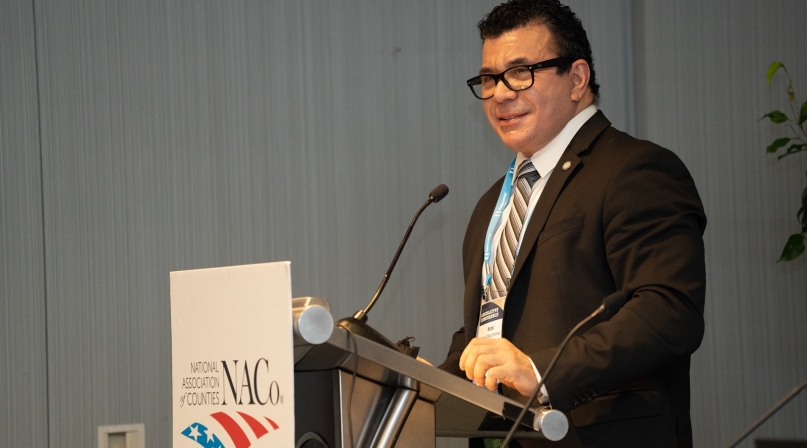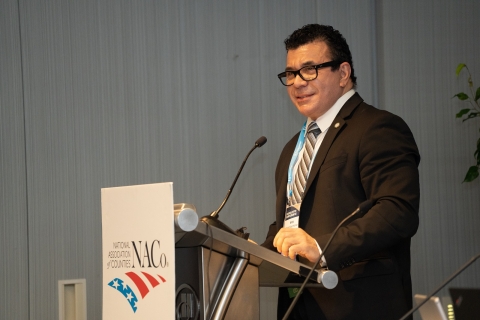Collaboration with providers key to healthcare challenges
Upcoming Events
Related News

Key Takeaways
During one of the first sessions of the 2022 Legislative Conference, NACo members discussed ways to create lasting partnerships to overcome healthcare challenges linked to incarceration, equity and financial difficulty.
“The Medicaid program is the central tool of counties in our role as administrators and operators of local health systems and safety systems,” Nick Macchione, San Diego County’s director of health and human services, told a NACo Health Policy Steering Committee meeting Saturday, Feb. 12.
Counties are gatekeepers of the nation’s healthcare system as fiscal partners, owners and administrators of 843 hospitals, 758 long-term care facilities, 750 behavioral healthcare care authorities and nearly 2,000 local public health departments, he noted. Counties are “essential primary implementers and innovators of healthcare programs and services.’
The NACo Medicaid and Indigent Care Subcommittee, of which Macchione is the Chair, has identified several ways to better support county residents:
-
improving equitable access to services
-
expanding the availability of services
-
and improving Medicaid flexibility by partnering with various state and federal agencies to create programs tailored to local needs.
By investing in partnerships with providers, bringing them up to the standards of Medi-Cal (Medicaid) and working to identify individuals entering the justice system who should not be there, counties can reduce their operating costs and better serve the community, he noted.
Macchione spoke at length about the situation in San Diego County, how the county managed to network with Medi-Cal (California Medicaid) and the state to provide higher quality service and reduce operating costs of existing county programs by breaking the cycle of continually treating at-risk residents.
“One out of 13 San Diegans has a substance abuse problem,” said Macchione. The county had to invest money into the agencies and providers to bring them into Medicaid compliance and build a network of support. While expensive and time consuming, in the long run the program saved taxpayer dollars and provided a better service to the community.
Chatham County, Ga. Commissioner Helen Stone said their journey to create behavioral crisis centers began four years ago with a petition for state-level support. Of their $280 million budget, over half goes to sheriffs, jails and courts. Frequent offenders often are at or below the poverty line with zero access to healthcare. Without support, these individuals will fall back into the system, continually using expensive resources not suited to their needs.
To modernize their system, Chatham County uses a behavioral crisis center or diversion center to put those who would otherwise enter the justice system into a facility that better suits their situation as well as provide better resources to the ones that need it most. Stone mentioned the importance of the NACo Stepping Up Initiative, which launched in May of 2015 aiming to help counties reduce the number of mentally ill residents incarcerated in county jails. Without the proper institutions in place, law enforcement and criminal justice systems are swamped with problems they are not designed to handle.

Attachments
Related News

NACo offers new Medicaid resources as Congress advances Budget Resolutions with major Medicaid reform implications
On April 10, the U.S. House of Representatives voted to adopt a Senate-passed budget resolution, marking the next step in the budget reconciliation process. The proposed funding levels therein represent significant potential cost shifts to counties, particularly in the area of Medicaid financing. To help county leaders understand what’s at stake, NACo has developed two new resources.

County Countdown – April 21, 2025
Every other week, NACo's County Countdown reviews top federal policy advocacy items with an eye towards counties and the intergovernmental partnership. This week features the ARPA reporting deadline, a budget reconciliation update and more

U.S. House reintroduces legislation to address the Medicaid Inmate Exclusion Policy
Two bipartisan bills aimed at addressing the Medicaid Inmate Exclusion Policy (MIEP) were recently reintroduced in the U.S. House of Representatives.